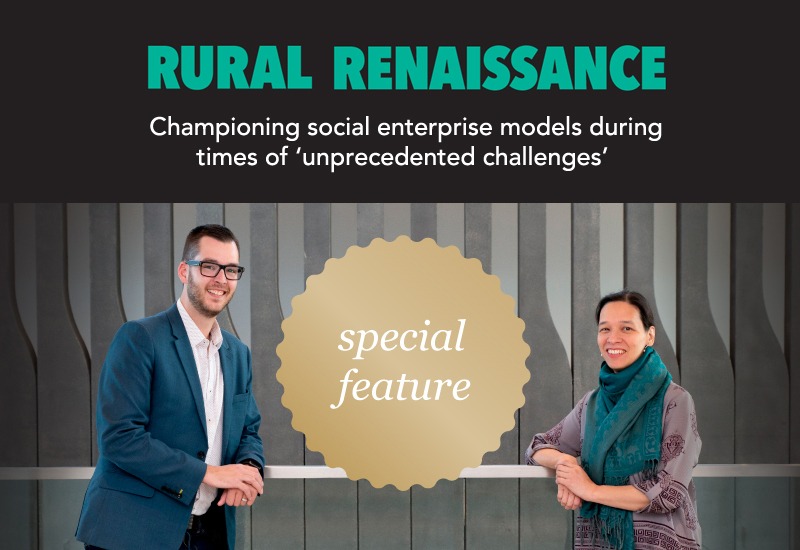Rural renaissance

Joanie Cranston believes there is strength in numbers.
The long-time entrepreneur, who has operated her own physiotherapy clinic in Norris Point for more than 30 years, says that by working together, communities in rural Newfoundland and Labrador can not only survive, but thrive.
“We believe that social enterprise and community-based research hold answers to some of the problems facing rural communities provincially, nationally and internationally,” said Ms. Cranston, director of the Bonne Bay Cottage Hospital Heritage Corporation, a not-for-profit community group that operates as a social enterprise, generating revenue to ensure its future sustainability.
“Solutions that are developed here can help other communities. Working together is always better than working alone.”
‘Home’ base
Social enterprises operated by non-profit groups like the cottage hospital play vital economic and social roles in communities.
Ms. Cranston’s group provides space for programs and services that otherwise may not exist in her region of the province: everything from massage therapy, exercise and yoga classes, a community kitchen, a public library, the Voices of Bonne Bay radio station and a local museum.
It also provides space for business incubation, employment opportunities and career development and training.
“This work is important because if we did not provide a “home” for these programs and services, they might not exist,” Ms. Cranston told the Gazette recently. “These programs and services help to improve the quality of life for people living in the region.”
Community builders
Successful social enterprise models underscore how innovative community-based groups are helping make a positive change, says Nicole Helwig, manager of Memorial’s Centre for Social Enterprise (CSE).
Since its launch in 2017, the CSE has forged strong partnerships with community groups such as the Bonne Bay Cottage Hospital, initiated student work placements in local social enterprises and helped promote social enterprise activities throughout the province.
Ms. Helwig says social enterprise helps reframe the role of business in society during times of “unprecedented challenges.”
“The concept of a social return on investment for example changes the narrative on what we value, highlighting social impact rather than exclusively financial return,” she said. “The social enterprises we work with generate revenue, but also value community-building, social inclusion, preservation of tradition and heritage, the natural environment, artistic creation and more.
“The work is also important because it links creativity to empowerment, focusing on social and economic development in ways that are just and sustainable,” Ms. Helwig continued. “This resonates with a new generation of students who wish to do good in addition to doing well.”
Making an impact
The CSE has also supported groups such as SMB Connect Inc., a non-profit, social enterprise operating in the St. Mary’s Bay region.
Formed in 2018, SMB Connect focuses on the integration of connectivity infrastructure to support further regional economic development. It recently secured the financing for a $1-million cellular system for the region.
Colin Corcoran, a founding board member of SMB, entrepreneur, former mayor of Riverhead, Memorial alumnus and director of finance and administration with Genesis, says each organization in the region has its own individual mandate and are often faced with decisions based on scarce resource allocation — requiring time, technical knowledge and financial resources.
“The capacity to take on yet another initiative just outside of their scope, even one that could benefit all, is difficult,” he said. “Utilizing a social enterprise as the vehicle in this instance helps to anchor the outcomes on not just profitability, but on community impact. Injecting business acumen into the decision making process allows for a better allocation of resources to make the business case work. If it was not for this structure, initiatives would not be feasible for the communities we serve.”
Mr. Corcoran says the CSE has provided connections, information about conferences and events, and students to work on community initiatives.
“One project focused on mapping the various assets in the region to identify opportunities for future development,” he explained. “The second dovetails into the second identified gap in the region: availability of high-speed internet. A team of business students assessed the feasibility of establishing a micro-internet service provider through various technical configurations. Without this support, adding to the limited capacity of SMB Connect, the organization would not have been able to advance on its second project.”
Bright futures
Both Mr. Corcoran and Ms. Cranston believe their groups’ futures are bright, thanks in part through the support they received from the CSE.
Each organization is looking at ways to expand their services and further collaborate with their regional partners.
“We have so much to contribute at a time when communities and the government are looking for new solutions to ongoing challenges,” noted Ms. Cranston.
“SMB Connect Inc. is a prime example of how co-operation among small, progressive communities in rural Newfoundland and Labrador can yield positive results,” added Mr. Corcoran. “Without the communities of Riverhead, St. Mary’s, Gaskiers-Point la Haye and St. Vincent’s-St. Stephen’s-Peter’s River, this would not have been possible.”